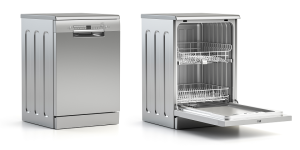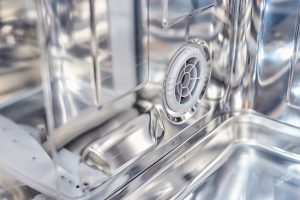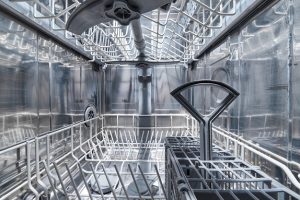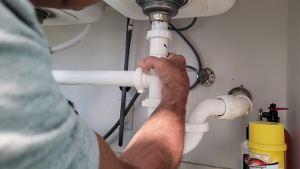What to Do When Your Dishwasher Leaks
If your dishwasher leaks at home, chances are you have encountered a problem when your dishwasher drains. If the water remains stagnant, it can be a real inconvenience and even a potential health hazard. Fortunately, there are some easy fixes that you can try. Before we check them, let’s find out why your dishwasher leaks.
Leaking Dishwasher – 6 Common Causes & Fixes
Is your dishwasher leaking? First up try to identify and see if you can fix the causes of the leak as sometimes it is a simple fix you can do yourself. Here are some common causes of dishwasher leaks.
1. Faulty or Clogged Hose
The most common causes of a dishwasher leak are faulty or clogged hoses. The hose can leak water if it is cracked, kinked, or torn. Even a minor blockage in the hose can cause pressure buildup, resulting in leakage. Check your hose regularly for any signs of damage or blockage. The hose will be connected to your sink drain and it’s easy to take off and see if a blockage at the end of the hose or where it connects to the sink drain is the issue.
2. Improper Installation

If your dishwasher wasn’t installed properly, it could be causing the leak. Make sure the dishwasher is level and that all connections are tightly sealed. Ensuring that the fill and drain lines are connected correctly is also important. Look at the screws on the side, at the top of the dishwasher. Has one come loose or both? It could be as simple as making the screws tighter or replacing them with new screws. They keep the dishwasher level and if it’s not level it can leak.
3. Detergent Build-up

If too much detergent builds up in the dishwasher, it can cause additional water pressure, resulting in a leak. You should clean your dishwasher once every three months to prevent detergent buildup and other debris from clogging the system. Supermarkets sell dishwasher cleaning tablets, try these and see if that stops the leak. It may have been caused by some grime or detergent build-up and the cleaning tablets should clear it.
4. Worn Seals and Gaskets
Seals and gaskets can become brittle over time due to age and wear and tear. Make sure to check your seals and gaskets regularly for any signs of damage or wear and tear, and replace them if necessary. You can check bunnings to see if they have them in stock if you feel confident in DIY. Otherwise, call a plumber to repair the dishwasher.
5. Malfunctioning Float Switch
The float switch automatically shuts off the water supply when the water reaches a certain level. If it becomes stuck or malfunctions, it can cause excessive water pressure, leading to a leak. This is most likely a problem a plumber can fix unless you have some knowledge of fixing a dishwasher DIY.
How do you find a leak in your dishwasher?
To fix the dishwasher leak, you need to find it first. Here’s how you can check.
- First, check the hose connections on the dishwasher for any signs of water leakage.
- Next, inspect the seals around the dishwasher door for any signs of water leakage.
- If you can’t find any sign of water leakage from the hose connection or door seals, try running a cycle with just a few dishes and a cup of hot water and then open the door during the cycle to see if you can spot any water leaking from somewhere within the appliance.
- If there is still no sign of a leak, call a plumber or if under warranty call the brand.
DIY Dishwasher leaks

1. Check the Drain Hose
Start by checking the drain hose for any blockages that could be preventing the dishwasher from draining. Unplug the dishwasher, remove the drain hose from the side of the dishwasher and clean it out of any debris or clogs.
2. Check Your Garbage Disposal
If a garbage disposal is installed on your sink, ensure it is not clogged. Remove any debris blocking it, and ensure it is running properly.
3. Clean Out the Filter

The filter in your dishwasher can become blocked with food particles and small objects. Clean out the filter and make sure it is not clogged.
4. Clean Out the Drain Pump
The drain pump can also become clogged with food particles or other objects. First, unplug your dishwasher and remove the bottom panel to clean out the pump. Then locate and clean out the pump and its housing of any debris or blockages.
5. Check for a Blockage in the Connections

Another possible cause of a dishwasher not draining could be a blockage in the connections from the dishwasher to any other appliance or pipe in your kitchen. Check these connections to make sure they are not blocked or kinked in any way. There could be a faulty water inlet valve or issues with the sink drain.
6. Contact a Plumber
If none of the above methods work and your dishwasher still isn’t draining correctly, call a professional plumber to look at it and diagnose what could be wrong with it.
Final Word
If your dishwasher is not draining, you may have a clog, or the motor may need to be replaced. If you have checked the filters and removed any clogs, but if it still won’t drain, call a professional to inspect the dishwasher and determine the issue.
Solving a dishwasher draining problem alone can be difficult and time-consuming. If all attempts to fix the issue yourself don’t seem to work and the dishwasher is still not draining, it may be time to call a professional.
A professional can assess the issue and provide an effective solution. They have the experience, tools, and expertise to complete the job and get your dishwasher running like new again.




